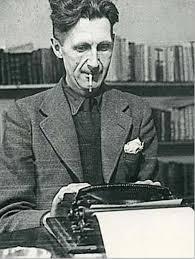“Suppose that Hitler’s programme could be put into effect. What he envisages, a hundred years hence, is a continuous state if 250 million Germans with plenty of “living room” (i.e. stretching to Afhanistan or somewhere thereabouts), a horrible brainless empire in which, essentially, nothing ever happens except the training of young men for war and the endless breeding of fresh cannon-fodder. How was it that he was able to put this monstrous vision across? It is easy to say that at one stage of his career he was financed by the heavy industrialists, who saw in him the man who would smash the Socialists and Communists. They would not have backed him, however, if he had not talked a great movement into existence already. Again, the situation in Germany, with its seven million unemployed, was obviously favorable for demagogues. But Hitler could not have succeeded against his many rivals if it not been for the attraction of his own personality, which one can feel even in the clumsy writing of Mein Kampf, and which is no doubt overwhelming when one hears his speeches….The fact is that there is something deeply appealing about him. One feels it again when one sees his photograph–and I recommend especially the photograph at the beginning of the Hurst and Blackett’s edition, which shows Hitler in his early Brownshirt days. It is a pathetic, dog-like face, the face of a man suffering under intolerable wrongs. In a rather more manly way it reproduces the expression of innumerable pictures of Christ crucified, and there is little doubt that that is how Hitler sees himself. The initial, personal cause of his grievance against the universe can only be guessed at; but at any rate, the grievance is here. He is the martyr, the victim, Prometheus chained to the rock, the self-sacrificing hero who fights single-handed against impossible odds. If he were killing a mouse he would know how to make it seem like a dragon. One feels, as with Napoleon, that he is fighting against destiny, that he can’t win, and yet that he somehow deserves to. The attraction of such a pose is of course enormous; half the films that one sees turn upon some such theme.”
– George Orwell, excerpt from his review of Mein Kampf, 1940
_________
While Mein Kampf is a dramatic representation of Hitler’s personal history, Orwell’s review has less to do with the merit of the text and more to do with Hitler’s faulty perspectives and the disfunctionality of the National Socialist ideal. Written sometime around the declaration of war by Britain, this article is mostly reflective in nature, making for a haunting read in light of the horrors of the War and the revelations of the Halocaust.
Orwell’s insight into Hitler’s appeal to a nation in Germany’s situation is perhaps one of the most clarifying responses to a question that would echo throughout the world in the decades following the War. We all shake our head and wonder simply, “How is this possible?” Orwell’s pre-war insight is the closest thing to an answer I’ve seen, and in reality it implies a thousand factors.
Charlie Chaplin’s film “The Great Dictator” came out around the same time that Orwell wrote this piece, and it too gives insight for modern generations to realize the troubling situations that many men foresaw. Chaplin himself said that if he had known the full extent of the lengths to which Hitler was going, he never would have made the iconic anti-Nazi film. I wonder what further insights Orwell would have added to his review a decade after its publication.
_________
Further Reading


